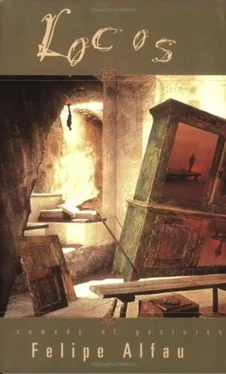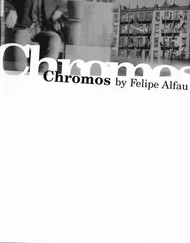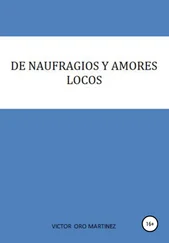As a contrast to that vivid experience, I do not remember what came after but I knew that there followed a period of studying under the insufferable circumstances of which I have already spoken. I never heard again from Pepe Bejarano. Soon after that, the term ended and the summer holiday began.
But before going on with my narrative, I must tell of an incident which, if I am to trust my confused memories of that time, began and developed during Padre Inocencio’s absence and came to a climax a little after the unfortunate incident that put an end to Padre Inocencio’s life.
I refer to another dog as huge and ferocious as the one of which I spoke before. This dog belonged to the school. It was a watchdog.
Every day, the moment the classes began in the school, this dog was released into the patio, through which we had to pass in order to reach the stairway which led to the classrooms. The purpose was, I presume, that should we arrive late to the class, the dog would attack and frighten us.
I remember arriving late one day and finding the dog. I remember how my heart sank to my heels. I beheld the door which led to the stairway at the other end of the enormous patio, distant, small and unattainable.
I stood there for a long time, the dog watching me. I thought of circling around the school, but gave up the idea as I knew that there was no other way of reaching the classroom where I was due.
The dog and I remained there for a long time looking at each other. The time was passing and my tardiness increasing. And then I made a resolution. I took some object, I don’t know what, and hurled it toward the farthest corner in the patio from the stairway. The dog made for it, and just as he reached it, when he was farthest from the point I wanted to gain, I started at right angles.
It was a mad sprint. I did not run, I flew, swept by uncontrollable panic. I can still hear the air humming in my ears and the dog, who had turned to chase me, was right on my heels. With a final desperate leap, I landed four or five steps on the stairway, past the door where I knew the dog was trained not to enter, and there I remained motionless, stunned by fear, panting from the strain and shock to my nerves.
I arrived very late at my class and the punishment I received on that account seems to me to this day out of all proportion, brutal, cruel beyond adequate description, and I therefore will not attempt to describe it. Perhaps I might be carried too far by my own feelings, feelings which I do not trust, for such was my mental condition in those days that sometimes I fear being unjust. I fear that my imagination enlarges on my experiences; that after all, perhaps things were not as bad nor people as cruel or indifferent as I imagine. For it seems unbelievable that a child of that age could go through so much for such a length of time and older people not know it; that a child could suffer to that extent and older people not offer him a helping hand. Yes, undoubtedly I imagine things worse than they really were.
But I know for one thing that those two dogs of which I have spoken played a great part in the drama of my existence and contributed largely to making those days some of the darkest of my life. They have left an indelible imprint from which I still suffer.
Those two dogs lined my path between school and home. There was a dog closing my way home where I wanted to go, and there was a dog closing my way to school where I had to go. These two animals loomed fatally in my childhood and framed my life, binding it with fear, a fear that woke and brought to the surface feelings that might better have remained dormant and which together with other things made my schooldays more harmful than helpful.
And then the summer. a feeling of immense freedom and infinite relief, at home or in the village park, without books, without dogs, without priests.! But my memories of vacation days are confused also, perhaps more so, for it is those things which are unpleasant which remain, due to a self-destroying desire, clearer in our mind or in our flesh. Our memory sometimes seems to pick the unpleasant things out of our past, with masochistic accuracy, and now that summer passes like a cloud gilded with sun, an ephemeral cloud carried away by a hurried wind of time, setting past the horizon of my memories. and then the night again. I began the third year of Bachillerato .
Things became more entangled. I remember passing through this course without understanding a single word of what I studied. Textbooks out of all proportion to our age. A purely theoretical education beyond our grasp. Priests too ill-tempered or impatient to explain, making us the victims of their personal feelings. Fourteen hours a day of study during a year, and all of them without exception gone to waste. Such is the education which explains the prodigious ignorance of a Spanish graduate.
But going back to the original theme, soon after the school opened we learned that Padre Inocencio had returned bringing with him a young nun from Madrid to the convent next to our school. There was much talk and gossip about the matter in school and out of it. We did not dare to ask Padre Inocencio and he did not seem to care to explain. But the talk went on and our curiosity increased
One day Alfau came to me:
“Garcia, do you know who the new nun is?”
“No.”
“Bejarano’s sister. You remember Pepe. Well, her name is Carmen Bejarano, they call her Sister Carmela.”
My curiosity knew no limits. We made several conjectures upon the subject. No one had seen her. Alfau had the most absurd ideas regarding the cause of her becoming a nun.
And that same day, I think, we went on the roof of the school and looked down at the convent’s grounds.
“You see that one there?”
“Which? That one? Why, that one was here last year.”
“No, not that one, the other. You see there by that tree?”
And then I saw her near some trees and up to this day I don’t know what I saw in that distant figure that woke something in me.
This term we felt a little happier. We knew that Padre Inocencio had come to stay the whole year and then there were several new things. I may not have learned anything during the classes, but I learned a number of other things. Among others, I learned from Cavañitas that some priests in our school had been seen mounting or perhaps dismounting the convent walls.
“Perhaps to steal some apples,” I advanced, and grew indignant because we had been bitterly punished for that same sin.
But Cavañitas winked at Alfau in that way of his that made me feel he was a man of the world and said that it was not for apples they went there. And then he added:
“You had better get wise to it all, Garcia. We are Los Madrileños and must not let this comehostias put anything over on us.”
The very irreverent way in which Cavañitas had referred to the priests shocked me a little but I was afraid to appear too innocent.
This was at lunch hour and we were in a corner at the patio. Cavañitas drew us closer to him and after looking about furtively began:
“Do you know Padre Mora?”
“Naturally, but what about him?” said I. Alfau seemed to know the story already.
“Well, do you remember the other day, when he told me to stay after the French class?”
“Did you stay after the French class?”
“You probably were half asleep and did not notice it,” put in Alfau.
“Probably, but what happened?”
“Well, he sat next to me and put an arm over my shoulder, and then began to say that I was naughty and forward and then—”
Padre Inocencio was coming toward us:
“Well, well, Los Madrileños always together. Come over to the convent with me. I want to present you to Sister Carmela. She is also from Madrid and she is the sister of Pepe. He spoke to her about you and she wants to know how bad you really are.” Padre Inocencio laughed. He seemed to be in excellent humor.
Читать дальше












